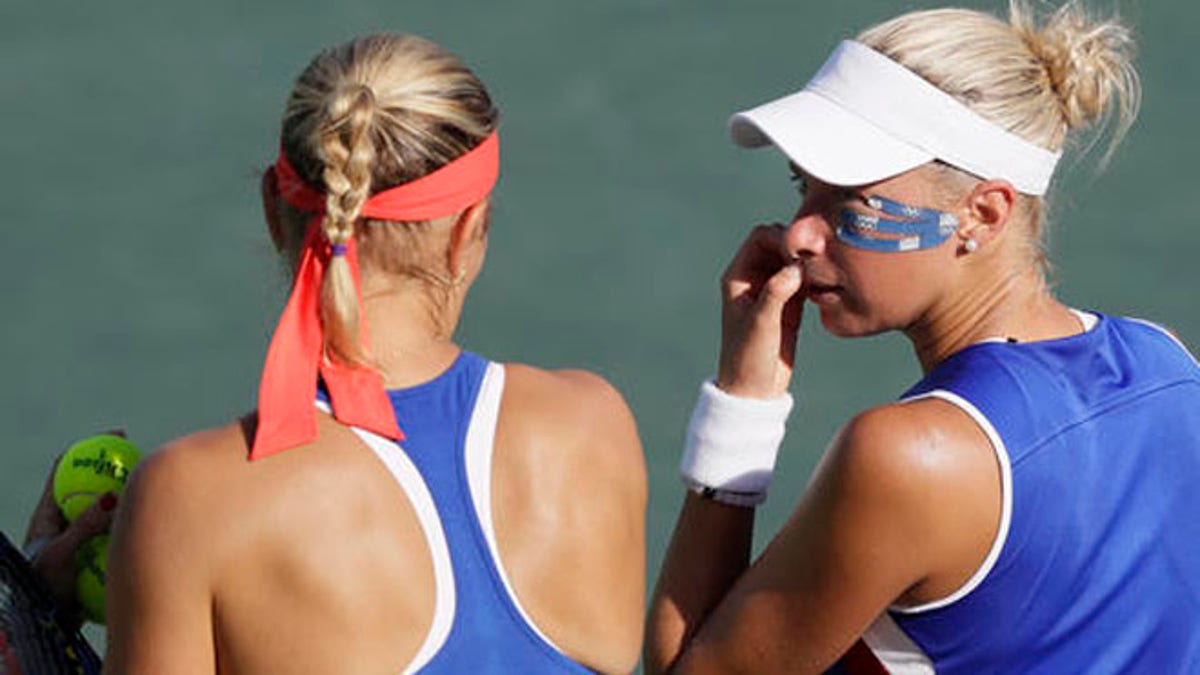
Tape around the eye of Andrea Hlavackova as she plays with partner Lucie Hradecka during women's doubles bronze medal tennis match at the 2016 Summer Olympics Saturday. (AP Photo/Kirsty Wigglesworth)
RIO DE JANEIRO – Andrea Hlavackova and Lucie Hradecka were both still awake at 5 a.m., a mere nine hours before they would play for the Olympic bronze medal.
Hlavackova had spent all night at the hospital, undergoing a CT scan after a volley to her face fractured an orbital bone. Yet she was more distraught the next day about her teammate's plight: Their women's doubles match was scheduled just 13 hours after Hradecka's mixed doubles quarterfinal ended after 1 a.m.
Their bodies betraying them both Saturday afternoon, Hlavackova and Hradecka went from being so close to a guaranteed medal to leaving Rio de Janeiro without one.
In Friday's semifinals, the Czechs were one point from victory when Switzerland's Martina Hingis crushed a swinging volley into Hlavackova's face. Hlavackova crumpled to the court in tears, and she and Hradecka went on to lose to Hingis and Timea Bacsinszky 5-7, 7-6 (3), 6-2.
Hlavackova spent five hours at the hospital, and as of Saturday morning, she was "90 percent" sure she couldn't play. But an hour before the match's scheduled 2 p.m. start, Hlavackova warmed up and felt OK, and she went on court with three blue and white strips of medical tape radiating from her swollen left eye.
Her compromised vision was a bigger problem than the pain. Still, the fear of straining her facial muscles too much meant she couldn't put the normal oomph into her strokes.
"I couldn't serve hard; I couldn't hit the balls hard," Hlavackova said. "I was really worried I would damage my eye."
Yet she and Hradecka were up a break in the first set, in position to serve it out. That's when Hradecka's ailments became the greatest impediment.
Her mixed doubles match with Radek Stepanek didn't start against Romania's Irina-Camelia Begu and Horia Tecau until nearly 11:30 p.m., because Tecau had played in the men's doubles final earlier in the night. Hradecka got to bed around 3:15 a.m. but couldn't fall asleep until about 6.
Asked how she felt on court Saturday, she replied with a pained laugh: "Totally dead."
And it caught up to her when she tried to serve out the first set.
"I felt like my legs are so heavy," Hradecka said. "From this moment, I couldn't move."
They went on to lose 7-5, 6-1 to Czech teammates Lucie Safarova and Barbora Strycova.
Hlavackova was incensed that tournament officials didn't schedule the bronze-medal match later in the day considering the timing of Hradecka's mixed doubles — and she said she let them know.
"There's no chance you can be ready for a match like that," she said. "It's really a failure."
Hradecka never considered pulling out of her mixed doubles quarterfinal.
"Radek is here just for the mixed," she said, "so I have to be ready."
After Friday's semifinals, Hlavackova's opinion of Hingis' volley was: "It happens." Hitting the ball into an opponent's body is an accepted strategy in doubles.
Then she watched a clip of the shot.
"She's one of the greatest who knows where to put the ball," Hlavackova said of Hingis, a 12-time major women's doubles champion. "When I saw the video and I saw the space which was around me, I have to admit that she could have put it away."
Hlavackova, who said she has a good relationship with Hingis, was also troubled by the Swiss star's reaction to the injury.
"She was more worried about not getting a medical timeout for me than about my eye," Hlavackova said.
Hlavackova may need surgery but is hoping she won't. Hradecka still has a chance at a medal in Rio de Janeiro, playing in the mixed doubles semifinals later Saturday.
Hlavackova and Hradecka, who were seeded sixth, do already own a medal together, winning silver in 2012 after a loss Venus and Serena Williams in the final.
Hingis and Bacsinszky face Ekaterina Makarova and Elena Vesnina of Russia for gold Sunday.
The bronze medalists, Safarova and Strycova, weren't even supposed to team up in Rio. When Safarova's original partner, Karolina Pliskova, withdrew, Strycova wasn't sure she would be allowed to replace her.
"Then we figure it out that we can," Strycova said, "and then we have a medal. It's amazing."
Strycova and Safarova had been 0-1 as a team, then they went out and stunned the three-time Olympic doubles gold medalist Williams sisters in the first round.
Close friends who played together in juniors, Strycova and Safarova tend to finish each other's sentences. If only the bronze didn't have to come at the expense of their teammates.
"It was awful," Safarova said.
"We know each other so well," she added. "Especially after what happened as well to Andrea yesterday."
At any other tournament, Strycova said, "you would be kind of like, 'Next week, guys, another chance.'"
Not when the Olympics roll around just once every four years.
"This is the one and only," she said, "and you want to get it so much."
